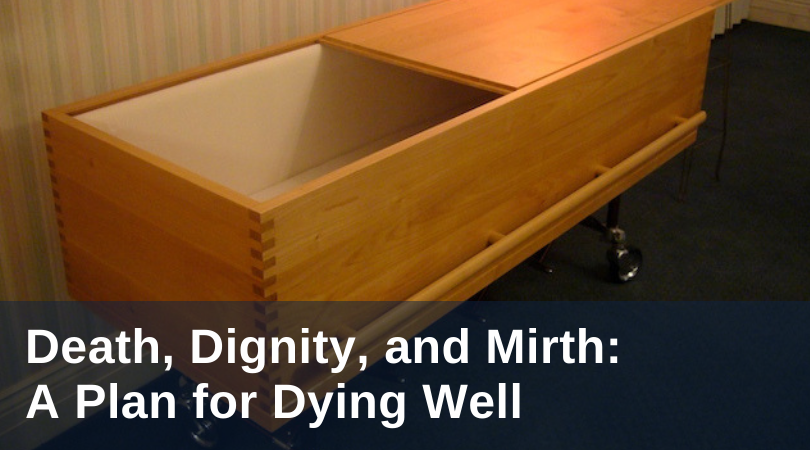
“Perhaps however joy is the outgrowth of suffering in a special way.”
Flannery O’Connor (The Habit of Being, 527)
My wife thinks it’s morbid, but I’m planning to buy myself a pine coffin for my 60th birthday. Nothing fancy. Something fashioned by monks. I’ll set it up in the living room—lean it against the wall with the lid to one side—and I’ll invite visitors to inscribe a few words with a Sharpie (my daughter’s idea, and a good one).
It’ll be the ultimate yearbook: familiar names, anecdotal tidbits, remembrances of joyful yesterdays. Personalized tethers to my past, particularly those who were part of it, the saints and sinners and saints-in-the-making—my comrades on the reeling road to redemption. And laughs, stuff that’ll make me laugh—not when I’m stiff and occupying the box, but now.
‘Cause I ain’t dead yet.
Why the creepy casket in the den? Simple. I want to remember my future death as I live in the present.
Look, death whacks you when it wants—or seemingly when “it” wants, because it’s God who gets to decide. Not the physician demi-gods, not the insurance companies (not yet, anyway), but the Creator himself. God gave us our earthly lives; he’ll end them when he decides our number’s up and it’s time to go.
It can happen any day, any moment. Thus, we have to be prepared—every day, every moment. Hence, the coffin next to the couch.
Perspective and humor are essential, along with courage, and those last two go together. It takes a comic outlook and courage to confront horrors, and physical death is a horror—one we can’t escape. To come to grips with it is a challenging, constant chore, yet we must do it. Not just when we’re doddering grumps, but all through life, especially in youth.
All the more so since we live in a fear-based culture when it comes to mortality. Quit smoking, diet, run marathons, but you’re still gonna die—and so am I!
Yet, as Christians, we see death in context and with a wry sense of the absurd. “O death, where is thy sting?” St. Paul gloats, and rightly so (1 Corinthians 15:55b). I mean, it’s all so ridiculous, really, and it’s not like it’s all hush-hush: we know we’re sinners who deserve to die—and deserve to go to hell to boot. But the Good News is that there’s hope, real hope! God is merciful, and the Lamb of God has wrought saving grace for us. That grace, available to us through the Church and the sacraments, makes possible a way out—and the heavenly bleachers are full of saints cheering us on to join them!
The turnstile to those bleachers, however, is physical death. We can’t get out of that. No matter. Dying is the coin of the Christian realm. It starts at Baptism, a dying with Christ, and it’s perpetuated in our daily lives as we take up cross after cross in imitation of him (Luke 9:23–24). Then, at some point, all that daily dying culminates in a final death, when soul is separated from body and our earthly tale terminates.
That’s the easy part, really—a moment, a tick of the clock. And it’s totally automatic. In fact, toward the end our role becomes largely receptive, as God refines our wills to the extent that we embrace whatever suffering comes along. “Sickness before death is a very appropriate thing,” Flannery O’Connor observes, “and I think those who don’t have it miss one of God’s mercies” (The Habit of Being, 163). We endure pain and suffering; we offer it up if we’re conscious. If not, we’re still being conformed to the crucified One, which is why we must insist ahead of time that no action should be taken to hasten our demise—no euthanasia, no assisted suicide, nothing like that.
In the meantime, stay alert—stay awake! Don’t be caught nodding off, morally speaking; we have work to do as we die. Rebuff distraction. Turn off the TV. Focus on what’s most important. Clamor for mercy and grace—for yourself and others. Suffer well.
Then, when it’s all over, rely on your loved ones to do their part, starting at the wake. I want mine to be a party—laughter, tears, all mixed together. And more signatures on the coffin as people pray for my soul.
The funeral, though, is where decorum ought to kick in. Please, make mine solemn—it’s liturgy, after all, and serious business. It’s supposed to help us on our way to heaven, so leave word that you want attendees to work hard. None of this “celebration of life”—not for me, anyway. No, make the priest wear black, for God’s sake—for my sake—not white.
And as they lower my remains into the ground, keep praying for me—and come back to visit now and again. If you bring along a Sharpie to leave your mark, I won’t mind. God willing, I’ll be in a place where I’ll grin and continue interceding for you.
Featured Image: Stephen Coles; CC-BY-NC-SA-2.0.


